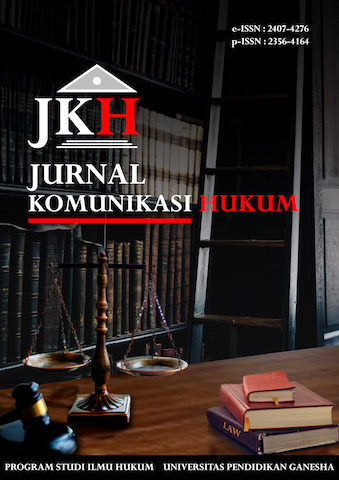KAJIAN YURIDIS TERKAIT PENENTUAN BESAR UPAH PEKERJA BERDASARKAN PASAL 88 C UNDANG-UNDANG NOMOR 11 TAHUN 2020 TENTANG CIPTA KERJA
DOI:
https://doi.org/10.23887/jkh.v8i2.52010Abstract
Article 88C paragraph (2) of the Employment Creation Law which states that the governor can set a district/city minimum wage under certain conditions. So if further observed the use of the word "can" in Article 88 C Paragraph (2) causes multiple interpretations. Based on the description of the background above, the author can formulate two problems, namely How is the Wage System Arrangement in the Law of the Republic of Indonesia Number 13 of 2003 concerning Manpower which has been changed to Law Number 11 of 2020 concerning Job Creation? And how is the determination of workers' wages based on Law Number 11 of 2020 concerning Job Creation? the type of legal research used is normative. To analyze the legal materials that have been collected, several analytical techniques are used, namely description techniques, interpretation techniques, evaluation techniques, and argumentation techniques. The conclusion of this research is that the regulation of the wage system in Law No. 11 of 2020 concerning job creation is that the type of wages is reduced, then the component of decent living is not included where the Job Creation Act is, and the length of service is not considered. Then the determination of the amount of wages for workers based on article 88 c of Law No. 11 of 2020 concerning job creation is that the Job Creation Law only provides for the obligation to set minimum wages at the provincial level, while at the district/city level it is optional or optional.
Downloads
Published
How to Cite
Issue
Section
License
Authors who publish with this journal agree to the following terms:- Authors retain copyright and grant the journal right of first publication with the work simultaneously licensed under a Creative Commons Attribution License that allows others to share the work with an acknowledgement of the work's authorship and initial publication in this journal.
- Authors are able to enter into separate, additional contractual arrangements for the non-exclusive distribution of the journal's published version of the work (e.g., post it to an institutional repository or publish it in a book), with an acknowledgement of its initial publication in this journal.
- Authors are permitted and encouraged to post their work online (e.g., in institutional repositories or on their website) prior to and during the submission process, as it can lead to productive exchanges, as well as earlier and greater citation of published work (See The Effect of Open Access).
Authors who publish with this journal agree to the following terms:
- Authors retain copyright and grant the journal right of first publication, with the work [SPECIFY PERIOD OF TIME] after publication simultaneously licensed under aCreative Commons Attribution License that allows others to share the work with an acknowledgement of the work's authorship and initial publication in this journal.
- Authors are able to enter into separate, additional contractual arrangements for the non-exclusive distribution of the journal's published version of the work (e.g., post it to an institutional repository or publish it in a book), with an acknowledgement of its initial publication in this journal.
- Authors are permitted and encouraged to post their work online (e.g., in institutional repositories or on their website) prior to and during the submission process, as it can lead to productive exchanges, as well as earlier and greater citation of published work (See The Effect of Open Access).












